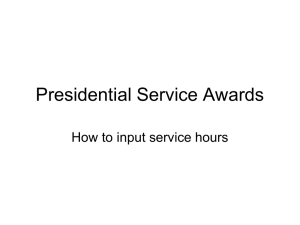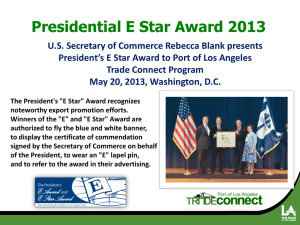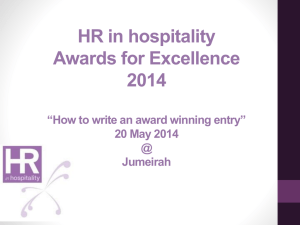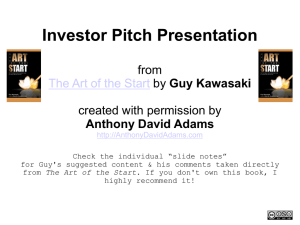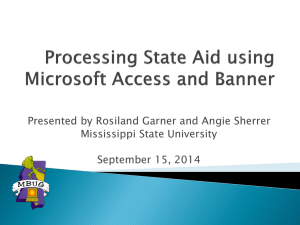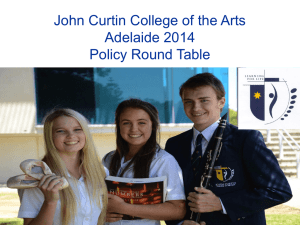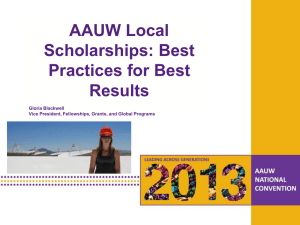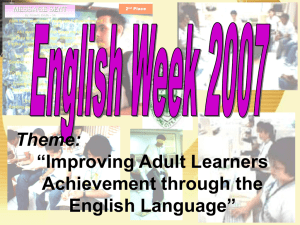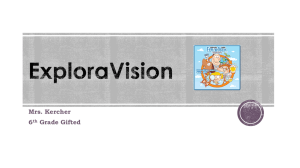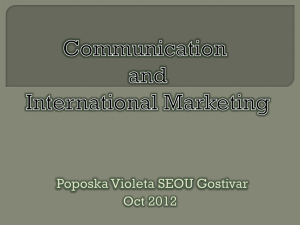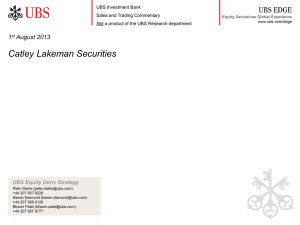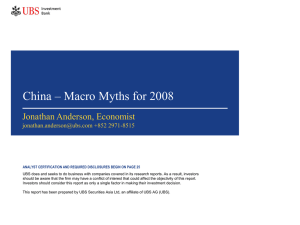Workshop Overview
advertisement
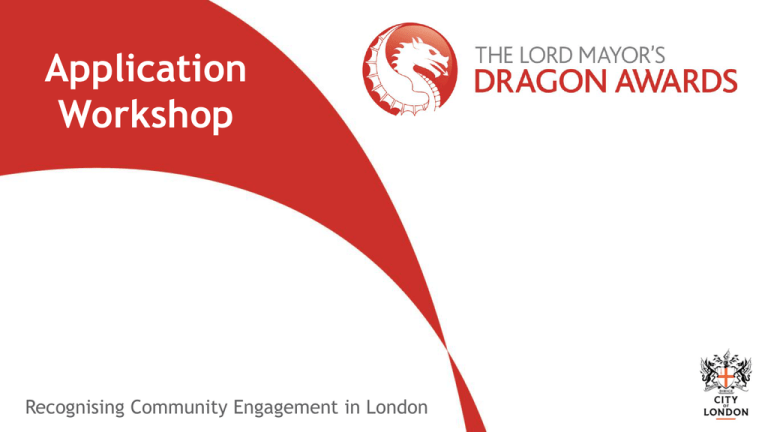
Application Workshop Recognising Community Engagement in London Workshop overview • Hopes and expectations of the morning • About the Dragon Awards − The Award categories − What qualifies for an Award − What makes it worth applying for an Award • • • • • Making the most of the application The judging process and judges What happens next Final thoughts and questions Optional session The Dragon Awards Putting the Awards in context The Award categories • • • • • Education Enterprise and Employment Strengthening the Third Sector Community Partners Heart of the City Award for Best New Community Programme • Lord Mayor’s Award for Longstanding Achievement What qualifies for an award? • Work that demonstrates good practice and innovation in working with businesses and facilitating their involvement in the community • Work that demonstrates building / maintaining effective partnerships • Partnership working that has a clear community benefit NB: Social Enterprises can apply in the Community Partners category if they act as a community partner or in one of the business categories if the programme is above and beyond their core activities Notes on the awards • Social Enterprises can apply in the Community Partners category if they act as a community partner or in one of the business categories if the programme is above and beyond their core activities • The project / partnership may involve more than one partner – but it is better to focus on one to “tell the story” What makes it worth applying • External recognition - Profile with clients/customers and the wider community Media coverage for the winner (in the past 3 years Dragon Awards publicity has been estimated to be worth over £760,000) Profile within CCI and CSR networks Profile with corporates and community partners Profile with funders • Recognition of corporate partners - Helps them to engage senior management Recognition of staff and volunteers involved in the programme …some more reasons to apply • Internal recognition within the organisation - Recognition of staff and volunteers working in the community partner to “make it happen” • Other reasons - Invitation to the dinner – a networking opportunity! The statuette It’s free Community Partners Award • Recognising the contribution of community partners and how they: - Engage and manage corporate interest and enable the corporate to be involved in the community - Build and maintain relationships - Engage, manage and support employee volunteers - Evaluate the value of the partnership and ways in which it can be strengthened - Look to the future An example from 2013 Pilotlight • • A charity that brings together business leaders with small charities Working with RBS, graduates were offered the challenge of creating practical solutions to real issues faced by a number of small charities. Their tasks included: − − − • • Developing a new numeracy app for children struggling with maths Marketing support for a campaign to attract funders Scoping out the creation of a social enterprise Pilotlight supported the relationship between RBS, their graduate volunteers and the different charities The benefits to community, community organisation and the business were considerable! An example from 2012 Guy Fox History Project - An educational charity that delivers arts and heritage projects which empower and inspire children to learn about the world around them. - Guy Fox is a cartoon fox who believes you can learn anything you want to! - Guy Fox and UBS have been working together to create educational activities for children. - UBS has supported Guy Fox with funding, volunteering and business support to deliver a wealth of educational workshops in which children create illustrate books for other children. - In return Guy Fox provides creative input into UBS’s Community Affairs strategy, recruitment and learning programmes, creating unique, skills enhancing activities. Give a clear description ….. Judges can only base their decisions on the information that is on the application form, so… • • • • • • Describe the community organisation, what it does and its objectives Give a clear description of the partnership and how it works Focus on what makes it work and how Highlight how the business is involved as well as who is involved Talk about the challenges you faced and how were these overcome Be positive and talk about the future potential for the programme Talk about input, output and impact Input • What? • Why? • How? • Who? • Where? Output • Community • • • What Who? How many? • Business • • • What? Who? Value to the business • Leverage Impact • Community • • • Beneficiaries Organisation The wider community • Business • Changes within the business Focusing on impact • Be explicit about what the business does for the community organisation and what the community organisation does for the business • Explain the impact the partnership has had on both partners and on the community − Give case studies • Give examples of how the partnership has benefitted the business • Highlight things that are innovative or different Telling the story • Include as much of the suggested information as possible • Use statistics • Include feedback from staff and volunteers • Include case studies • Talk about the things other say about the work; include external recognition Tell us why you should win • Showcase the best of your partnership • Talk about why it is special or possibly even unique • Talk about what makes it a success and the challenges you have overcome What the judges say It is a great community programme but it was hard to see how the partnership worked What impact did it have on the local community? This was a great application. It was very clear how it worked and what each partner gained from the partnership. It showed an equal relationship! It assumed I knew all about the project. It really would have benefited from a short explanation! Judging the Awards • The finalists are selected by the Preliminary Judging Panel • The winners are selected by the Final Judging Panel - chaired by the Lord Mayor • Judges work in pairs and focus on specific categories – assigned a primary and secondary category to judge • Conflicts of interest are declared at the start • A mix of experience and expertise The preliminary judging panel • • • • • • Heather Barker – CSR Consultant Linda Barnard – Community Affairs Manager, Bank of England Michelle Dawson – Director, Community Operations ELBA Jenny Field – Deputy Chief Grants Officer, City Bridge Trust Patsy Francis – Director of Community Affairs, UBS Bob Fry – Managing Director, Aukett Swanke • • • • • • Carolyn Housman – Director, Heart of the City Sophie Hulm – CR Manager, City of London Jon Lloyd – Director, Corporate Citizenship Poorvi Patel – London Operations Director, Business in the Community Helen Sanson – Director, Tower Hamlets Education Business Partnership Vicky Clark – Employment and Skills Consultant, LB Haringey The final judging panel • • • • • Alderman Fiona Woolf CBE – The Lord Mayor of the City of London Matthew Bowcock – Chair, Community Network Foundation Lady Diana Brittan DBE – Chair, The Connection at St Martin’s in the Fields Martyn Lewis CBE – Chair, Youthnet Harvey McGrath – Co-Chair, London Enterprise Panel • • • • • • Amanda Jordan – Co-Chair, Corporate Citizenship Ken Olisa – Chair, Restoration Partners Richard Sumray MBE – Chair, London 2012 Forum Cyrus Todiwala MBE – Proprietor & Executive Chef, Café Spice Namaste Group Catherine Usher – Regional Managing Partner - London, DLA Piper Ruwan Weerasekera - Managing Director, UBS What happens next Application Deadline – 23 May Preliminary Judging – 23 June Finalists announced Final Judging – 14 July Annual Dinner – 1 October The annual dinner • 1 October • Hosted by the Lord Mayor at Mansion House • Black tie • All Community Partner applicants receive two complimentary invitations, one for staff plus one for a beneficiary • Finalists receive a third invitation Contact Details Telephone: 020 7332 3608 Email: dragonawards@cityoflondon.gov.uk
